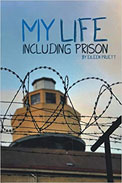
 |
Pruett, married to the man she loved and met through her involvement with The Church of Jesus Christ of Latter-Day Saints, was a busy and dedicated mom, raising no less than eight children. Having joined the Church at age thirteen, she often dreamed of the day she would attend Brigham Young University in Utah, in some ways a world away from the small rural New Hampshire town where she grew up. In February of 1968, she met Don. Their first date was a movie date, seeing The Graduate. There's a good reason the idiom "The rest, as they say, is history" is cliché, as this certainly applies in the life of the author of this absorbing, comprehensive memoir.
The reader meets Laddie, who for many years worked alongside Pruett in her role of inmate caseworker with the prison system, where she was responsible for a wide array of duties from housing assessment to prison intake to her primary work as caseload manager. She met regularly with the inmates, assessed through deep-dive research if and when any were to be recommended for parole, and reported her findings to her higher-ups. Throughout the book, Pruett shares anecdote after anecdote from her career working with both the inmates and her colleagues. The relationships she established—especially with those behind bars—are eye-opening and not necessarily what one might imagine. Sometimes unsettling, sometimes extremely humorous, the reader is treated to an "insider's look" into the realities of work as a member of the prison staff.
This memoir easily stands out as being unique from page one to the end. It describes how the author learns to navigate her "two worlds" of home life—rearing her beautiful children and deep involvement with the Church—versus the career where she "truly felt free." The chapters themselves alternate between these two realities. For example, as readers learn of the many struggles and victories in one setting, many of the same issues are mirrored in the other. Pruett's choice to tell her story in this manner is perhaps its greatest strength.
Additionally, the author's voice is exceedingly down-to-earth, humble, and frank. Here is a woman who has accomplished so much good in terms of helping other people in ways both large and small and is now simply telling her story. Completely absent of any pretense, she comes across as having a laid-back conversation with the reader. This is quite refreshing, and in the process, one becomes intimately familiar with the intricacies of learning how the author eventually acquired confidence working in such close proximity with men who have committed any number of crimes—including in some cases the unimaginable acts of murder and rape.
Pruett completed her degree in childhood development and family relations, with a minor in mathematics, through a combination of home study and night classes. In retirement, she now has more time and energies to devote to her true, cherished passions. Among these are genealogical research, connecting the dots to an ever-increasing family tree record through individual, intriguing stories of relatives, and preserving visual artifacts (such as photographs and the like). Her memoir is a well-written record of a fascinating career and a life well-lived.
RECOMMENDED by the US Review